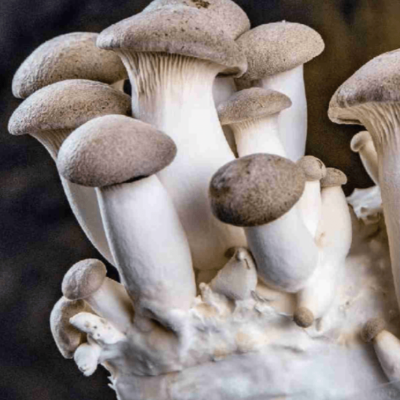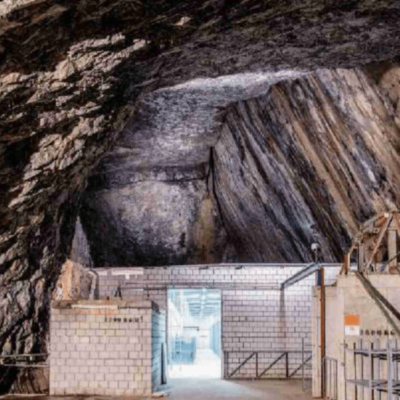Where ammunition was once stored in the army bunkers in Erstfeld and Stansstad,
Alex Lussi, today, grows Shiitake and Oyster mushrooms sustainably. The Bunkers are ideal for this.
Thousands of disused military installations pierce the country of Switzerland. These days they are experiencing a civil revival!
Mushrooms from the Bunkers
“My father started growing oyster mushrooms 24 years ago,” says Alex Lussi. “At that time the company was called LUPI, Lussi-Pilze. The cultivation of oyster mushrooms was a sideline to the farm, a traditional dairy farm with an agricultural area of 18 hectares. ”
The 35-year-old business owner Alex Lussi grew up growing mushrooms. As a 10-year-old, he was already helping with his parents’ business. After an apprenticeship as a tool mechanic, he moved to Holland in 2007. He learned the language in order to deepen his knowledge of various Dutch companies. Annual study trips to mushroom farms in China, Japan, Korea, the USA, France, Italy, Poland, and Spain followed.
Alex Lussi and his company Gotthard Bio Pilze AG have been producing shiitake mushrooms in a disusedArmy Bunker in Erstfeld since 2013. In 2014 Alex Lussi took over his parents’ business and expanded it. In 2016, a tunnel was added as a second production site on the Steinag Rotzloch AG site in Stansstad. The substrate production takes place on the farm in Oberdorf.
Production sites steeped in history.
Today grow, in around 100 meters long and 40-meter high cavern, organic noble mushrooms. “The production conditions in the mountain are ideal,” explains Lussi. The average temperature is 12 to 14 degrees Celsius, the humidity is around 90 percent perfect. ” There is no need for expensive air conditioning as in a production hall. This enables Gotthard Bio Pilze AG to save costs and produce competitively.
Oyster mushrooms, shiitake, and king oyster mushrooms
“We produce four different noble mushrooms,” says Alex Lussi. “The oyster mushroom, yellow and gray with its juicy, aromatic, and firm meat is extremely popular. Its taste is somewhere between the mushroom and the chanterelle. Shiitake means mushroom (take) in Japanese that grows on the Pasania tree (shii). It comes from the forests of China and Japan and is very popular there as a medicinal mushroom. The king oyster mushroom has a wonderfully fine-spicy aroma similar to the boletus. ”
Every mushroom has its own requirements
for raw materials, process times, and climate. The oyster mushroom grows on wheat straw, enriched with lucerne and gypsum. These ingredients are mixed, pasteurized, and cooled after six days. The cooled mass is then mixed with the fungal spores that have settled on rye grains as a carrier material. After the block pressing into cubes around 50 cm in size, the mushroom needs around two weeks to bond with the straw and branch out. In the culture room, the fungus can counter-grow against the light through the holes made in the plastic. The oyster mushrooms can be harvested around four weeks later. Much longer, the growth time of shiitake mushrooms takes 20 weeks.
Close cooperation with Wauwiler Champignons AG
Wauwiler Champignons AG, with a weekly production of around 50 tons, the largest mushroom producer in Switzerland, owns 40 percent of the share capital in Gotthard Bio Pilze AG from Nidwalden. Around 85 percent of production goes to Wauwil. “We are deepening our partnership in the production of organic noble mushrooms and working even more closely together,” says Lussi. “Oyster mushrooms, king oyster mushrooms, and shiitake are picked and delivered there for customers.” Gotthard Bio Pilz AG produces 120 tons of fine mushrooms per year. Gotthard Bio Pilze AG can save costs by using synergies.
Consumers prefer Swiss mushrooms
Mushrooms are trendy, the mushroom market in Switzerland is growing. The market share of Swiss mushrooms is 80 percent. Nevertheless, the competition from Holland and Poland is causing problems for Swiss producers. Since the mushrooms are picked by hand in Switzerland too, the wage costs are particularly significant, the production costs are 40 to 50 percent higher than in the EU. «The market is open. There is no border protection and no subsidies in mushroom production, ”says Lussi. He therefore regularly obtains information from colleagues in Holland so that he can react to changes in the market in good time.
«We have to use our advantages consistently: Our mushrooms are fresh and quick in the store. Our historical production facilities are of interest, ”says Lussi. “We still have space in our production rooms, we can increase production and expand the variety of mushrooms on offer. It is important that we produce inexpensively, maintain the quality and improve our level of awareness. ”
Gotthard Bio-Pilze AG, Erstfeld







No comments:
Post a Comment